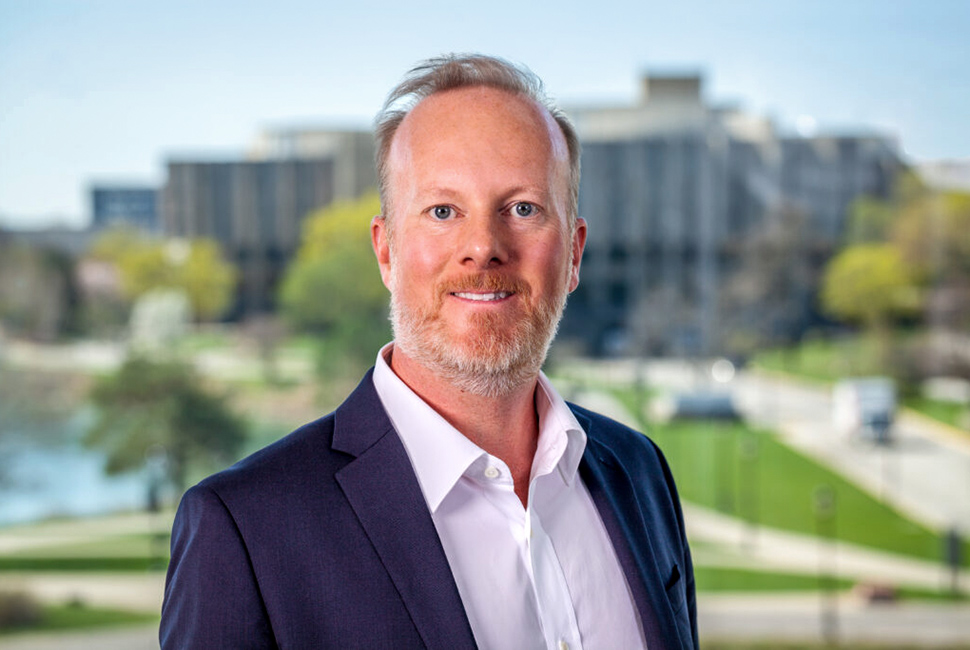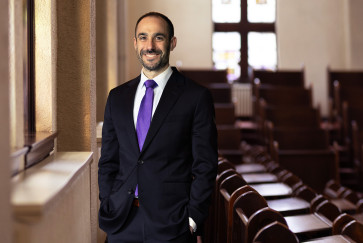Northwestern University has named Ted Sargent co-executive director of the Paula M. Trienens Institute for Sustainability and Energy (formerly ISEN). Effective immediately, Sargent joins current executive director Michael Wasielewski, the Clare Hamilton Hall Professor of Chemistry, in overseeing one of Northwestern’s preeminent University-wide research hubs.
The Trienens Institute brings together faculty talent from across various disciplines — including engineering, the natural and social sciences, business, law and public health — to advance transformational research, cross-field education and public engagement.
Sargent is an internationally renowned multidisciplinary researcher in materials chemistry and energy systems, with appointments in the Department of Chemistry in the Weinberg College of Arts and Sciences and the Department of Electrical and Computer Engineering in the McCormick School of Engineering.
A groundbreaking scientist with 65 patents to his name, his work has contributed to fundamental advances in new materials. His laboratory includes a focus on carbon capture and upgrade to develop efficient CO2-recycling fuels and CO2-sequestering materials.
He and his team also are engaged in advancing the performance of high-efficiency solar cells, as well as advancing the next generation of sensor technologies based on colloidal quantum dots, a type of semiconducting nanocrystal. He joined Northwestern’s faculty in 2021, following his tenure at the University of Toronto where he served in various leadership capacities, including as vice president for research and innovation of the university and, previously, vice dean of research in the Faculty of Applied Science and Engineering.
“I look forward to helping lead the Trienens Institute, which draws exceptional strength from the comprehensive excellence of its researchers who cover every domain crucial to sustainable energy research,” Sargent said, noting the critical importance of the social sciences, humanities and Northwestern’s world-renowned professional schools, as well as the STEM departments. He described each academic unit as having a key role to play in this “all-hands-on-deck big lift for Northwestern and for the planet.”
A key strategic priority will be to further engage the collaborative potential of the University’s researchers in sustainable energy and redouble efforts to promote Northwestern’s excellence in this arena.
“Northwestern is already one of the world’s leading centers in sustainability and energy research and its translation,” Sargent said, crediting Wasielewski for further elevating the University’s renown in this area. “Yet there is even more we can do to raise further the profile, impact and resourcing of Northwestern’s commitment and power to work together on challenging problems where our tremendous expertise and collaborative spirit lead to important climate, social and economic impacts.”
Launched in 2008 as a presidential initiative and later named a pillar of Northwestern’s “We Will” strategic plan, the institute advances global sustainability and energy solutions through transformational research, interdisciplinary education and public engagement. It is home to four research centers and three major research programs focusing on climate and carbon science, the impact of plastic and other products on the environment, and solar-based fuels.
The institute has leveraged the University’s strengths in team-driven science to attract significant philanthropic support, including, most recently, a generous $25 million naming gift from the Howard and Paula Trienens Fund. Over the past decade, it has garnered nearly $65 million in outside funding focused largely on developing multidisciplinary, multi-school research centers. In addition, it established a highly successful Master of Science in Sustainability and Energy that prepares future leaders for important fields, while also providing hundreds of undergraduates with a flourishing certificate program.
“Ted’s innovative and boundary-spanning research aligns exceptionally well with the mission of the Trienens Institute,” Vice President for Research Milan Mrksich said. “And he joins a research hub that is thriving, thanks to Mike Wasielewski’s longstanding leadership and strategic vision. We are extremely fortunate to have these exceptional faculty members helping shape such a critical part of our research portfolio.”
Wasielewski will remain part of the senior team at the Trienens Institute for the next year. He also will continue to direct the Center for Molecular Quantum Transduction (CMQT) and will begin serving as director of the Initiative for Quantum Information Research and Engineering (INQUIRE).
“I am proud to have directed the Institute for Sustainability and Energy at Northwestern for the past decade, and I look forward to meeting new challenges during the upcoming transition year,” Wasielewski said. “The Trienens Institute’s work is critical for discovering new solutions to transition society to renewable energy and to provide the tools for establishing sustainable practices worldwide.”
Yet, he adds, challenges remain significant. These include developing more efficient solar capture materials, finding ways to efficiently store energy from renewable sources, decarbonizing a wide range of industrial processes and implementing sustainable practices in urban and rural areas.
“These challenges are accompanied by the equally important need to develop novel political, social and economic strategies required for rapid implementation of new solutions to benefit society,” Wasielewski said.
It is an exciting and urgent time to advance innovation that strengthens sustainable practices, supports resilient communities and helps solve the many challenges associated with climate change, Provost Kathleen Hagerty said.
“Northwestern’s ongoing commitment to this research spans departments and schools, with many of our efforts flowing through the Trienens Institute,” she said. “With Ted and Mike’s leadership, along with the institute’s exceptional staff and faculty affiliates, this flagship hub will continue to attract the best global talent to create a better global future.”
Matt Golosinski is director of communications in the Office for Research.


